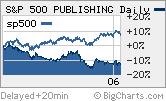|
Newspapers: Dead trees don't equal dead money
Despite the slowing growth in print publishing, some see value in newspaper and magazine stocks.
NEW YORK (CNNMoney.com) – The obituary has been written. The old-school publishing business is dead. At least, that's what Wall Street thinks. Shares of newspaper and magazine publishers had a rough year in 2005 and are off to an unpromising start this year as investors worry about waning demand for print products.
Why pay for some ink-stained broad sheet when you can keep your hands clean and read the same stories from your favorite daily newspaper online...often for free. Heck, why read a newspaper at all when you can go to a blog? And who needs the classified ads to find an apartment, job or a date when there's Craigslist, Monster.com and MySpace...not to mention Yahoo! (Research) and Google (Research)? With that in mind, many of the major publishing companies that are on tap to report their fourth-quarter earnings this week are expected to post lackluster results. Analysts are forecasting a 4 percent drop in earnings for Gannett (Research), a 7 percent decline in profits for Dow Jones (Research) and a 21 percent plunge in earnings for The New York Times Co (Research). Still, there may be some hope for select stocks in the industry. The extreme pessimism may have created some opportunities for investors. "In general, the sector is relatively undervalued," said James Walden, an analyst with Morningstar. "The newspaper publishing industry faces significant challenges with the growth of search engines and declining circulation but these companies remain very profitable." (Walden doesn't own stocks that he covers and his firm does not perform investment banking.) So where might some of the bargains lie? Dow Jones has a new chief executive officer, Richard Zannino, and last week, Goldman Sachs upgraded shares of the Wall Street Journal publisher, citing the management change as one key reason. Knight Ridder (Research) is one of the few big publishers expected to post a profit increase for the fourth quarter. In addition, the company put itself up for sale in November and the stock has risen more than 20 percent since then. Knight Ridder has reportedly attracted the interest of rivals like Gannett and McClatchy (Research) as well as private equity firms. And depending on how much Knight Ridder gets sold for, Walden said a deal could put pressure on other newspaper companies to sell out, which could drive up stock prices throughout the group. "How the Knight Ridder situation plays out will have an important consequence for the whole sector," Walden said. "If Knight Ridder is taken over with a significant premium, it's reasonable that shareholders of other publishing companies will ask themselves, 'Where's ours?'" Along those lines, Scott Black, manager of the Delphi Value fund, said that two publishing companies his fund owns, McClatchy and Lee Enterprises (Research), could be an attractive acquisition for a private equity firm since even though sales growth is sluggish, both companies generate a stable amount of free cash flow. "It's a real conundrum. These are slow growth businesses on the top line but they are huge cash machines," said Black. Walden said that his top picks in the sector are two that probably aren't going to get bought but have done a good job of diversifying beyond the dead-tree world. The Washington Post Co. (Research), which also owns the Kaplan education business and has a cable subsidiary, and E.W. Scripps (Research), which owns the Food Network and HGTV cable channels, are his favorites because of their diversification. Black said he also owns The Washington Post, in addition to Lee and McClatchy, and that he also likes Gannett. He said all four companies are well-run and trading at reasonable valuations. However, he admits that he doesn't expect sentiment on the group to change overnight. "Younger people aren't reading. There is a secular decline," he said. "So people have to understand that these companies are swimming uphill." Finally, one magazine publisher is bucking the gloomy trend in print. Meredith (Research), which publishes popular magazines such as Better Homes and Gardens and American Baby, is expected to report a fourth-quarter earnings increase of 19 percent on a more than 30 percent jump in sales. Last year, Meredith acquired several magazines from rival publisher Gruner & Jahr, including Family Circle and Fitness, to broaden out its portfolio of lifestyle magazines. And that's a big reason behind the company's growth. "Meredith is a company that we like and its acquisition of the Gruner & Jahr castaways was a good strategic move for them," said Walden. Gannett gets the (text) message. Click here.
To see why Fortune's Andy Serwer likes newspaper stocks, click here. |
| ||||||||||||||||||||||||||||||||||||||||



